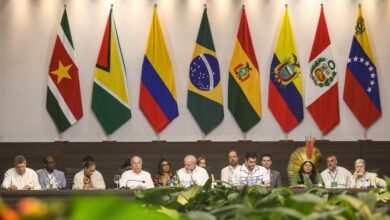A mass movement that deeply shook a military dictatorship; years of radicalized strikes that eventually overthrew a regime; contradictory forces disputing the drafting of a constitution in the midst of a highly tumultuous process — we are speaking not about today’s Egypt, but Brazil during the 1980s.
Brazil is regarded by many in Cairo and beyond as a paradigmatic role model of democratic transition. Its Magna Carta, also known as the “citizens’ constitution,” arouses both interest and inspiration across the region and beyond.
While it is true that Brazil’s constitution frames quite progressive social and economic rights, idealizing it in the context of a bleak political scenario in Egypt can have detrimental effects on revolutionary consciousness.
After 25 years of a US-backed military dictatorship, the Brazilian generals were removed from power in a somewhat similar way to their Egyptian counterparts. Following a period of social unrest, a spontaneous massive strike movement shook the very tenets of the dictatorship’s political economy, leading to its overthrow and the drafting of a new constitution.
From 1978 to 1986 — a period known as Brazil’s political opening — strikes in Brazil grew from 118 to 1,004 a year. And in 1989, when the constitution was finally re-drafted, 3,943 strikes were recorded, in which more than 18 million workers took part. All in all, from 1978 to 1989, 12,673 strikes occurred, mobilizing over 53 million Brazilians.
With the support of the strike movement, different forms of radical social struggle started to emerge. Landless peasants, fighting for agrarian reform, occupied huge patches of land. The homeless in the cities took over empty buildings used for retail speculation. Women organized against gender oppression and students struggled for free high-quality education. The black and indigenous communities fought for historical reparation and against structural racism.
Constitutions, inevitably, are a written expression of the correlation of political forces in a historically specific moment. It is only logical that during such a period of mass mobilizations, Brazil’s new constitution would essentially be progressive.
And so it was. The so-called “citizens’ constitution” defends the rights of indigenous peoples to their ancestral lands and it demands unproductive farms be used for agrarian reform. It prohibits the neglect of private property such that it serves no social function. The constitution ensures the right to a dignified life, gender equality, religious tolerance, universal healthcare and social housing for all. It emphasizes the right to leisure and work, along with a pleasant retirement.
Compared to disputes surrounding the constitution today in Egypt, where profoundly reactionary forces are at play, it is no wonder that Brazil’s constitution has the status of a paradigmatic role model.
But, while Brazilians could count on a strong working-class party and a powerful union movement to express their will, the lack of such instruments in Egypt seems to be what determines the differences between both countries.
The process of mass mobilizations in the Middle East and North Africa — while numerically superior to anything that has ever happened in South America — continues to lack channels through which to direct the progressive demands of the masses. The lack of strong and independent working-class organizations has made social change in the region, even during a radical revolutionary process, qualitatively inferior to social transformations in countries like Brazil.
However, a deeper look at Brazil’s constitution opens quite a few spaces for criticism. For instance, for the leaderships of the different social movements, the designation of private property in relation to the means of production as a “human right” by traditional right-wing politicians made the constitution useless.
Many had already noted the impossibility of guaranteeing social rights while at the same time protecting capitalist social relations. And while most social and popular movements distanced themselves from the document once it was finally completed, the intense process of drafting huge parts of it had contributed to erecting illusions amongst diverse sectors of the masses about the importance of institutional, state-centered political disputes.
Furthermore, writing all these rights into the Brazilian constitution meant very little in practice. Urban reform regulation in Brazil, for instance, was approved only 10 years after the constitution codified the right to the city as a human right. During this period, the focus on legislative battles inevitably led to the movements’ abandoning direct action for occupying and reinventing the urban.
So while Brazil now has extremely progressive urban legislation, the lack of social movements to defend these rights on the streets has turned them into little more than nice words on paper.
Brazil’s constitution, without any doubt, is far more progressive than the drafts discussed in Egypt over the past few months. But its limits, both in content and in the final product of its process, must be taken seriously.
It is in the mass character of the movement that took part in discussing Brazil’s constitution, and ultimately, rejecting it, that the true inspiring experience lies.
Aldo Sauda is a Brazilian journalist and activist.
This piece appears in Egypt Independent's weekly print edition.




